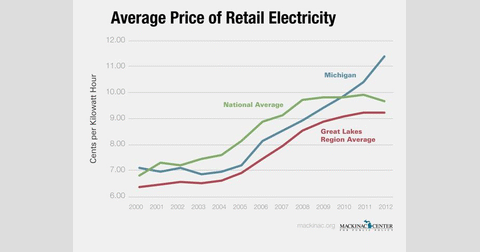Expert: Utilities Distorting Electric Choice Track Record
Q&A on regulation vs. choice in electricity markets
(The Mackinac Center for Public Policy is hosting a discussion at noon today about energy markets. Click here to watch that broadcast.)
According to an energy market expert, Michigan's incumbent electric utilities are misrepresenting what's happened in states that have unregulated electricity markets.
In a recent interview, Phillip R. O’Conner, president of Chicago-based PROactive Strategies, a policy analysis provider specializing in insurance and energy regulation, said that contrary to the claims by representatives of Consumers Energy (CMS) and Detroit Edison (DTE), open competition has been a winner for residents of the states that have it.
O'Conner responded to comments made in a Jan. 11 Michigan Capitol Confidential article by a spokesman for the Michigan Jobs Energy Coalition, which represents CMS and DTE,
The following are excerpts from the interview with O'Conner:
Q: You saw the statement the spokesman for utilities made in the article, "Bill Would Open Up Competition In Michigan's Electric Market." What is your response?
A: Yes, it tells you a lot about what the utilities in Michigan are trying to do. It's clear that they want to control the dialog. Unfortunately, what they said about Illinois in the article bears no relationship to what's really going on there. I think [those who support electric deregulation] should get together with the other side (those who oppose deregulation). They could send their best guys and we’d have a debate.
What they've done with deregulation in Illinois should be a model for states like Michigan. I can also tell you about what's really been happening in the other states where the Michigan utilities claim deregulation has been a problem.
Q: Compare the situation in Illinois where the electricity market has been deregulated about 10 years with Michigan's where electric competition has been capped at 10 percent since 2008.
A: Back at the beginning of deregulation in Illinois, Illinois consistently had the highest rates in the Midwest and many people believed nothing could be done about it. Now, Illinois has the lowest rates in the region. Look at the average rate in Illinois compared to the average rate in Michigan. The difference is 3¼ cents per kilowatt hour for residential customers. In Michigan it is 11 1/3 cents, while in Illinois it's slightly over 8 cents.
What does this mean to people in Michigan? If you want to compare the market based on 2013, it means Michigan ratepayers are paying $3 billion more annually than if they had completion.
Q: What about the other states, which, according to the Michigan utilities, are having bad experiences with electric deregulation?
A: They bring up Arizona, but what they didn't tell you was that the problem there had nothing to do with the market. In Arizona the problem was that the state constitution said only their [public service] commission could set the price of electricity. Now there are people in Arizona talking about changing their constitution.
In Montana, which has a small population, the situation was that the law was not well put together. Their problem was not caused because of electric choice. And what they said about New York was not true at all. In New York, the big supporters of deregulation are the utilities. They (Michigan utilities) said they are considering re-regulation in New York, but you can always find examples of one or two lawmakers who will take almost any position.
Q: What does the overall picture look like nationally, regarding regulated electricity market and deregulated markets?
A: Nationally, 30 states are regulated, 14 are open for competition and Michigan is one of the five that have a hybrid market. That's a big part of the problem in Michigan — it's neither fish nor fowl.
You can't really compare prices nationwide because in some regions, such as those in the Northeast, costs are just higher overall. What you have to do is compare [rate increases] against inflation. In the 14 states with competition, prices have fallen 5 percent against inflation; in the 30 that have regulated markets, rates rose 15 percent more than inflation; and in the hybrid states, like Michigan and California, it has been a disaster.
Q: What about the other states Michigan's utilities mentioned?
A: Let's talk about Texas. If someone just got on the phone and contacted the Texas Public Service Commission they'd find out the truth. Since adopting [electric] choice, Texas has added more [electric] generation than there is in all of Michigan.
In New Jersey and Maryland they have the largest single pool in the country. Deregulation has been so successful there that PJM (Pennsylvania, Jersey Maryland Electric Company) is attracting customers outside of its region.
Q: Do the utilities in some states support deregulation?
A: In the 14 states that have deregulation, the utilities are supporters of it.
Steven Transeth of the Michigan Jobs Energy Coalition did not respond to a request for comment.
Michigan Capitol Confidential is the news source produced by the Mackinac Center for Public Policy. Michigan Capitol Confidential reports with a free-market news perspective.


 DTE makes 5,170-page case for $619 million rate increase
DTE makes 5,170-page case for $619 million rate increase
 DTE can’t tree trim its way to reliability
DTE can’t tree trim its way to reliability
 Michigan regulator seeks proposals for audit of DTE, Consumers
Michigan regulator seeks proposals for audit of DTE, Consumers